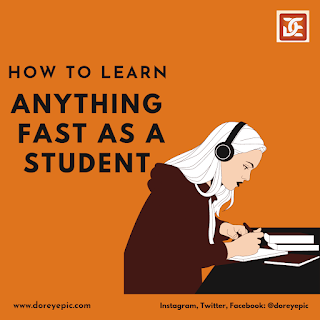By Obafemi Grace
For students, it's sometimes hard to learn new topics fast. What's worse; we have numerous things to learn. Sometimes (most times actually), school work can be so tedious, strenuous, and drilling. We grapple on most categories, just trying to keep afloat. Not only do we rush to get to classes, but we also fight to secure seats, and most times even skip meals and strive to hear the lecturer till the end of the class (especially for those of us in public universities). And in the twinkling of an eye, boom, tests. It's almost a cycle and if we're not intentional about our studies, it can just be a loophole that we're all trying to scale through.
To avoid scenarios like this, and to be duly prepared for emergency tests or class exercises, here are a few tips on how to learn anything fast!
• The Sleep Sandwich.
The sleep sandwich is just an efficient way of studying. The procedure is like this ; study ➡sleep ➡
study. This way, it's easier for your brain to retain information, and in that manner, the information changes from the frontal lobe of the cerebral cortex (where short-term memory is kept) to the prefrontal cortex (where the long-term memory is kept). It also makes your brain relax, and process information that had been transferred to it. It also helps you focus and relax before getting up to study. Also, take breaks in between your study.
• Mastery through modification.
Most times, we have a set schedule. Wash plates, sweep, fetch water, iron clothes then study later. This is a monotonous routine and can be boring most time.
Changing your routine makes your brain become sharper and susceptible to accommodate changes. This innovates you to read better.
• Weaving Subjects.
Another beautiful way of learning information faster is by weaving subjects.
This refers to a process of connecting learning. This simply means that you should be able to relate what you've learned in the present to another discipline or another thing you've learned before.
Like, scrambled stuff. If there are scrambles in a particular subject, and there are scrambles in another, you should be able to link them together, for easy recollection.
• Chewing gum.
Even though a lot of speculations and superstitions have been made concerning those that chew gum, research has proved that chewing gum is a great stimulator for learning. It makes your brain active and makes you stay focused for longer on tasks that require continuous monitoring. It also increases a hedonic tone. So dear, when next you want to observe a study marathon, remember to take a pack of chewing gum with you.
• Intellectual hydration.
This just refers to you drinking lots of water. Water increases your cognitive function. Also, your brain needs a lot of oxygen in order to function at optimal levels. (Water is H²O). It also improves concentration and helps you to balance moods. It's best you take a bottle of water before you begin to read and in the middle of your session.
• Multiple Mediums.
For a better learning experience, it's best you combine various studying styles together. Like, you blend different styles that you can study. There's the SQ3R method that involves learning only the most important facts in a textbook and highlighting them, the retrieval system of remembering what you've learned at a later time, and the Feynman technique by learning information very fast and breaking it down into bits and atoms or simple terms, the Leitner system that involves using flash cards, color-coded notes, the mind mapping that helps you categorize each info you're learning like a map, etc. Using all these styles, and diversifying on how to study helps you retain information fast.
• Speed Read.
When you're reading, a way to remember what you're reading better is to speed read. Speed reading helps you to build your reading skills. You read all the words in just a short time. An average person reads up to 300 words per minute.
Speed reading helps you set a goal when you're reading. Also, it helps you to shut out distractions when you're reading, and to set timers. Speed reading over time helps us to read better, and it teaches us to embrace time management. It makes you identify the goal of what you're reading too.
•Using music as a stress relief.
Another shocking discovery is that music helps when you're
reading. As a matter of fact,studies have shown that music helps for
better concentration. Music helps studying enjoyable,and it increases
your productivity level. However, it's best to listen to music without
lyrics,or to listen to songs that you're not familiar with,so you don't
get distracted singing their lyrics. Music also liberates one's mood.
• Practice in pieces.
Practicing in pieces entails you studying in bits. For example,
going through a few pages each day. This way,you can ruminate over what
you've learnt previously,and you can also review it.
This procedure calls for better retention of memory.
• Taking notes.
Taking notes when you study helps you remember them fast. It also helps you have something to rely on, during emergencies.
With these helpful tips,I hope remembering information fast becomes easy.
See you at the top!!😊
Also,make this people do make we go back school abeg. 😓





.jpg)

0 Comments